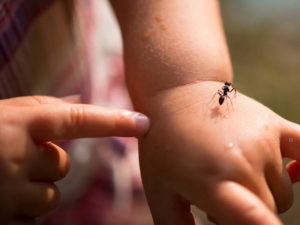Fire ants belong to a group of insects known for their ability to sting and potentially cause considerable pain upon biting. When they bite, they release a venom that leads to a burning feeling and swelling. In this article, we will guide you through identifying and effectively managing fire ant stings.
Contents
How To Identify The Bite/Sting
When trying to identify the bite or sting, there are a few things you can look for. Here are a few of the most common symptoms:
- A burning sensation at the site of the bite/sting
- Swelling around the area
- Redness and irritation
- Blisters filled with pus
These are just a few of the most common symptoms, but it’s important to remember that everyone reacts differently to being bitten or stung. If you suspect you’ve been bitten or stung, it’s always best to seek medical attention just to be safe.
Symptoms Of Stings By Fire Ants
It’s also important to know that fire ants are different from other types of stinging insects. These pests can actually sting you multiple times, and their venom is more potent than most. This means that the symptoms of a fire ant sting can be more severe than a regular insect sting. For more serious reactions, you may experience the following symptoms:
- Intense burning pain at the site of the sting
- Swelling that lasts for several days
- Nausea and vomiting
- Difficulty breathing
It’s important to seek medical attention if you experience any of these symptoms after being stung by a fire ant.
Why Do They Bite And Sting?
Now that you know how to identify a fire ant bite or sting, you’re probably wondering why these pests do it in the first place. Fire ants are actually very aggressive, and they will sting or bite anyone or anything that they perceive to be a threat. This includes humans, animals, and even other insects.
Fire Ant Bite Treatment
It’s important to seek medical attention if you are experiencing a severe reaction to a fire ant sting. However, there are also some home remedies that can help ease the pain and discomfort of a fire ant bite. Here are a few of the most effective treatments:
- Wash the area with soap and water to remove any venom that may be present.
- Apply a cold compress to the area to help reduce swelling.
- Take an over-the-counter antihistamine to help relieve itching.
- Apply a topical ointment or cream to the area to help soothe irritation.
These are just a few of the most effective treatments for fire ant bites. If you’re ever unsure about how to treat a bite or sting, it’s always best to consult with a medical professional.
Related Post: Ant Species All Johor Bahru Homeowners Should Know
Fire Ant Prevention
Now that you know how to identify and treat fire ant bites, you’re probably wondering how you can prevent them in the first place. The best way to prevent fire ant bites is to avoid these pests altogether. Here are a few tips that can help:
- Wear long pants and long sleeves when outdoors, especially in areas where fire ants are known to live.
- Do not disturb fire ant nests or colonies.
- Be sure to keep food and trash properly sealed and away from fire ants.
- If your house is infested with fire ants, contact a pest control professional to have them removed. This is the best way to keep yourself and your family safe from these aggressive pests.
Conclusion
As you can see, fire ant bites can be painful and uncomfortable. However, there are some simple treatments that can help ease the pain and discomfort. Additionally, there are also some things you can do to prevent these bites in the first place. If you follow these tips, you’ll be able to avoid fire ants and the potential for being bitten or stung.


